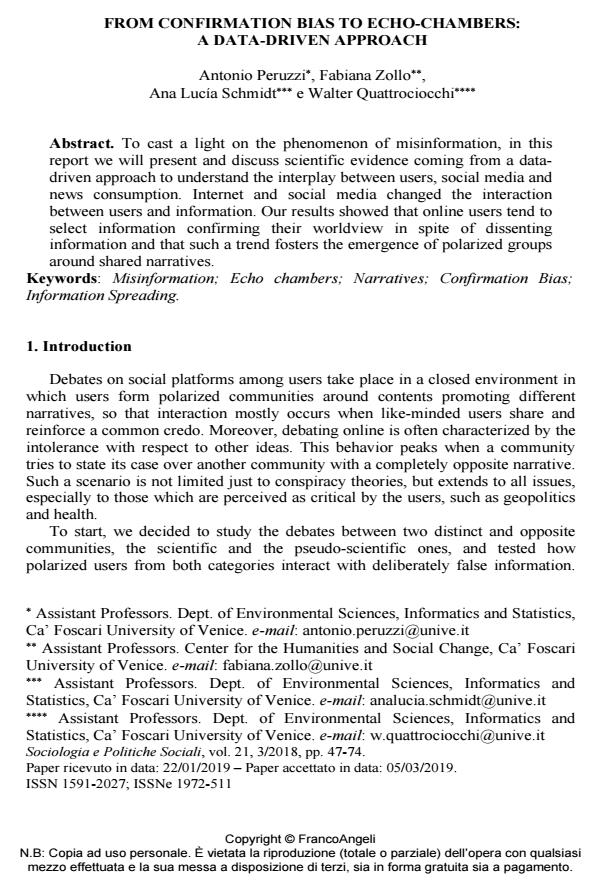From confirmation bias to echo-chambers: a data-driven approach
Journal title SOCIOLOGIA E POLITICHE SOCIALI
Author/s Antonio Peruzzi, Fabiana Zollo, Ana Lucía Schmidt, Walter Quattrociocchi
Publishing Year 2019 Issue 2018/3
Language English Pages 28 P. 47-74 File size 1033 KB
DOI 10.3280/SP2018-003004
DOI is like a bar code for intellectual property: to have more infomation
click here
Below, you can see the article first page
If you want to buy this article in PDF format, you can do it, following the instructions to buy download credits

FrancoAngeli is member of Publishers International Linking Association, Inc (PILA), a not-for-profit association which run the CrossRef service enabling links to and from online scholarly content.
To cast a light on the phenomenon of misinformation, in this report we will present and discuss scientific evidence coming from a data-driven approach to understand the interplay between users, social media and news consumption. Internet and social media changed the interaction between users and information. Our results showed that online users tend to select information confirming their worldview in spite of dissenting information and that such a trend fosters the emergence of polarized groups around shared narratives.
Keywords: Misinformation; Echo chambers; Narratives; Confirmation Bias; Information Spreading
- Conspiracy beliefs and perceptual inference in times of political uncertainty Salomé Leclercq, Sébastien Szaffarczyk, Pantelis Leptourgos, Pierre Yger, Alexandra Fakhri, Marielle Wathelet, Vincent Bouttier, Sophie Denève, Renaud Jardri, in Scientific Reports 9001/2024
DOI: 10.1038/s41598-024-59434-4 - Information Pollution as Social Harm: Investigating the Digital Drift of Medical Misinformation in a Time of Crisis pp.69 (ISBN:978-1-80071-522-6)
- Human Resource Development in South Korea Ahlam Lee, pp.235 (ISBN:978-3-030-54065-4)
- Science denial and medical misinformation in pandemic times: A psycho-criminological analysis Anita Lavorgna, Heather Myles, in European Journal of Criminology /2022 pp.1574
DOI: 10.1177/1477370820988832 - Interbrain Synchrony Mitigates Extremism Within Echo Chambers Aial Sobeh, Tomer Marcos Vakrat, Simone Shamay‐Tsoory, in Annals of the New York Academy of Sciences /2025 pp.117
DOI: 10.1111/nyas.70083
Antonio Peruzzi, Fabiana Zollo, Ana Lucía Schmidt, Walter Quattrociocchi, From confirmation bias to echo-chambers: a data-driven approach in "SOCIOLOGIA E POLITICHE SOCIALI" 3/2018, pp 47-74, DOI: 10.3280/SP2018-003004